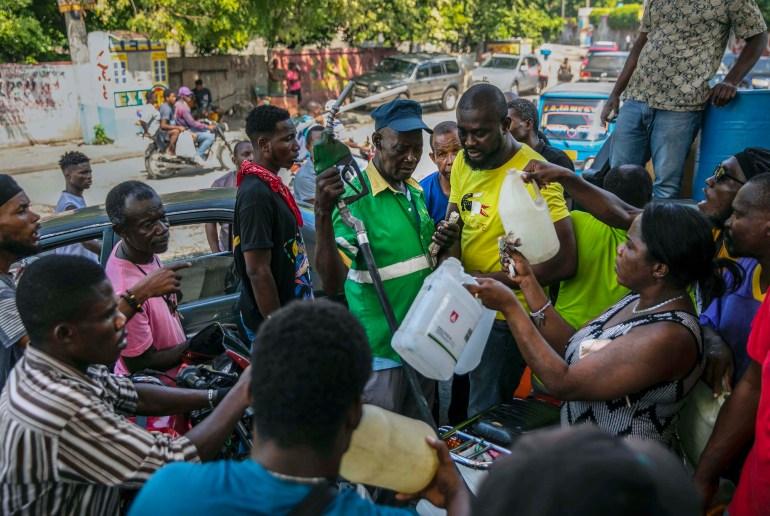Ariel Henry dismisses government ministers, commissioner as Canada imposes new sanctions against Haitian gang leader.
Haiti’s acting Prime Minister Ariel Henry has sacked the country’s justice and interior ministers, along with its government commissioner, in a new round of political upheaval that comes under the shadow of international sanctions.
Former Justice Minister Berto Dorce first dismissed Government Commissioner Jacques Lafontant on Henry’s orders before being removed himself days later along with Interior Minister Liszt Quitel, according to documents obtained by The Associated Press news agency on Monday.
Henry did not say why the officials were removed, and his spokesperson could not be immediately reached for comment.
Henry has become Haiti’s interior minister while still serving as prime minister – he took up the latter post in July 2021, less than two weeks after the killing of President Jovenel Moise. Emmelie Prophete Milce was named justice minister, the fifth one in the past two years.
The Caribbean nation has seen soaring violence and instability as increasingly powerful criminal gangs have been battling for control in the political vacuum created by Moise’s assassination in Port-au-Prince on July 7 last year.
A weeks-long gang blockade on a key petrol terminal in the capital that began in September led to water and electricity shortages, fuelled rising rates of hunger, as well as hampered local healthcare workers’ response to a deadly outbreak of cholera.
Haitian authorities regained control of the Varreux terminal earlier this month, and on Saturday, cheers echoed through the streets of Port-au-Prince as gas stations opened for the first time in two months.
“There’s gas now! There’s gas now!” people yelled as they honked their horns, and motorcycles zoomed past. “I would call this the day that life begins again,” said Davidson Jean-Pierre, 35, who owns a small house-painting business.
Last week, nearly 400 trucks lined up at the terminal to fill up their tanks with fuel as a heavily armed police convoy escorted them to gas stations in the capital and beyond.
The truck drivers arrived after Haiti’s powerful G9 gang alliance, led by former police officer Jimmy Cherizier – known as “Barbecue” – announced that it was lifting the blockade days after fighting with police who sought to reassert control over the area.
On Monday, Canada announced new sanctions against Cherizier under a United Nations Security Council-approved “sanctions regime” that targeted him and other members of criminal gangs in Haiti last month.

The Canadian government said it “has reason to believe this individual has engaged in acts that threaten the peace, security, and stability of Haiti and has planned, directed, or committed acts that constitute serious human rights abuses”.
“The sanctions Canada imposed are intended to stop the flow of illicit funds and weapons to weaken and disable criminal gangs,” it said in a statement.
Canada and the United States last week also sanctioned two Haitian government officials over their alleged ties to gangs, as the two countries continue to hold talks for the establishment of a “non-UN, international security assistance mission” in Haiti.
Victoria Nuland, the US undersecretary of state for political affairs, is holding a virtual meeting on Tuesday with Canadian and Caribbean Community (CARICOM) leaders “to discuss Haiti”, the state department said in a statement on Monday.
Henry, the prime minister, had appealed to the international community in October to set up a “specialised armed force” to quell the violence – a call backed by UN Secretary-General Antonio Guterres.
But some Haitian civil society groups have rejected the prospect of foreign intervention. Many rights advocates also questioned Henry’s legitimacy and blamed him for the political turmoil after he indefinitely postponed presidential and legislative elections last year.


